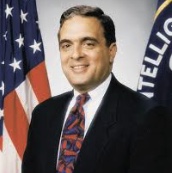
To some Washington critics, it is “Albright’s War” By Carol Giacomo
>WASHINGTON, April 7 (Reuters) – Following a time-honoured tradition, Washington is looking for someone to blame for the Kosovo crisis — and right now, most fingers are pointing at Secretary of State Madeleine Albright.
Some have even dubbed the latest Balkans conflict “Albright’s War”, after the Clinton administration’s leading advocate of backing diplomacy with force.
It is an ironic turn of events for the first woman to be America’s chief diplomat.
Born in the former Czechoslovakia, she was twice made a refugee by the Second World War, once took refuge in Belgrade with her diplomat father and speaks some Serbian.

It is a history that Albright has regularly invoked as she championed the case for using U.S. political and military might as an instrument for peace and freedom.
Since her days as U.S. ambassador to the United Nations from 1993 to 1997, she has been closely identified with U.S. policy toward the Balkans, often prodding a reluctant administration to take more muscular action.
With Yugoslav forces still on the move after 15 days of NATO air strikes and 500,000 Kosovo Albanian refugees creating the worst humanitarian disaster in Europe since the Second World War, second-guessing is rife among officials and experts horrified by the unintended consequences of allied action.
“If there was one person who completely miscalculated, it was Albright and (State Department spokesman James) Rubin”, one expert who helped shape U.S. Balkan policy said.
“They were the ones who pushed the notion that a bit of bombing would bring (Yugoslav President Slobodan) Milosevic around”, the expert told Reuters.

Albright and her aides have been faulted for underestimating Milosevic’s readiness to move ruthlessly against the Kosovo Albanians and overestimating the ability of NATO air power to bring him to heel.

In recent days, much has been written about how senior Pentagon officials expressed doubts before the war that air power would move Milosevic and how CIA Director George Tenet warned that the Serbs would respond with ethnic cleansing.
Albright, in an interview on Wednesday on the CNN television programme ‘Larry King Live’, referred to those reports as part of ‘a strange game’ commonly played in Washington. “It’s called cover-your-you-know-what, and I don’t want to engage in that”, she said. “The Monday-morning quarterbacks are criticising a game when it’s still in the first quarter.”
Albright noted that she was ‘a product of Central Europe’ and said she had seen what happens “when you don’t stand up to evil early.” She agreed that some critics were deliberately personalizing the Kosovo crisis.
But she added, “This is not my war … This is America’s fight for our values”.

Rubin, one of Albright’s closest advisers and a person who was deeply involved in the formation of U.S. Kosovo policy, defended his boss at Wednesday’s State Department briefing.
“It is inaccurate to suggest that she expected the Serbs to accept the Rambouillet accords (a last-gasp effort at achieving a Kosovo peace settlement before the NATO bombardment began) or to back down shortly after the air campaign”, he said.
“You know, we all wanted to see this problem solved peacefully. That was our goal. We tried every possible avenue, and we’ve tried everything we could to deal with this peacefully, but at the end of the day, President Milosevic wasn’t prepared to act”, Rubin said.
Critics say if Albright and President Bill Clinton were serious about winning a confrontation with Milosevic and saving Kosovo Albanians from ethnic cleansing, they should have deployed ground troops in Yugoslavia.
It is an option Clinton continues to reject.
A U.S. official said the administration feared such a move would shatter the NATO consensus in support of air strikes as well as stir fierce opposition in the United States.

Kurt Bassuener of the Balkan Action Council, which backs strong action against Milosevic, including ground troops, said Albright had been unfairly targeted.
“If anybody miscalculated, it was President Clinton. I don’t think Albright thought we should forswear the use of ground troops, and I don’t think she thought we should do that two weeks into the air campaign”, he said.
He said that many people, including those in his own group, did not expect the ferocity and speed with which Milosevic moved against the Kosovo Albanians.
Many also believed the Yugoslav leader would sue for peace soon after air strikes began, but “obviously, that’s been proven wrong”, he said.